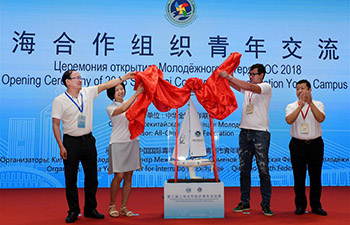CHENGDU, July 17 (Xinhua) -- Yu Dingsi, 60, had tried everything to make money -- planting fruit trees, breeding silkworms, raising sheep -- but nothing worked until poverty relief cadres came to help.
Born in Bazhougou Village of Tongjiang County in China's Sichuan Province, Yu's left foot became disabled when he was six. Yu and his mentally challenged wife are recognized as "double-disabled families" in China and are one of the targets of China's poverty relief campaign.
After the reform and opening-up in the late 1970s, Yu, like many other farmers, hoped to get rich by exploring and developing different agricultural industries.
He first tried planting fruit trees, but limited market demand led to low profits. Then he grew mulberry trees and bred silkworms, providing silk to a local factory. Due to his lack of experience, his investment yielded low production, and he was once again bankrupt.
Yu was in debt for 55,000 yuan (around 8,230 U.S. dollars) in 2011 after half of the 60-plus goats he bought with a loan died.
"Yu was very discouraged after he failed in the goat business. He didn't even bother to trim his hair. We thought we should help him not only financially, but that we should also rebuild his confidence," said Chen Maolin, Party chief of Xinchang Township where Yu lives.
Wang Jun, a poverty relief cadre, was assigned to help Yu. "When I first came to Yu's house, I found it clean and tidy though very old, which led me to believe he was very hardworking. After talking to him, I realized he had not lost his dream of being rich," said Wang.
In 2012, the Chinese central government targeted 14 impoverished regions across China that would become the country's main battlefields in its war on poverty. Wang is among hundreds of thousands of officials who have since been sent to live in impoverished villages, fighting poverty alongside villagers.
Their daily duties include visiting low-income households and discussing poverty relief measures such as industrial development with local officials, etc.
Over 68 million people have been lifted over the poverty line -- defined as per capita annual income lower than 2,300 yuan -- in the past five years in China. As of the end of 2017, there were still 30.46 million Chinese citizens still below the poverty line.
Efforts are being focused on areas of abject poverty and special groups of poor people like Yu so that no village or individual will be left behind.
Li Wendong is another poverty relief cadre of the village in charge of agricultural technology. After evaluation, Li and Wang decided the village was most suitable for farming crops, raising livestock and developing tourism.
"As an agricultural technician, we customize a development plan for each village," said Li.
Wang helped Yu obtain 100,000 yuan from bank loans and government funding, teaching him how to raise pigs, and find buyers.
In 2015, Yu purchased 61 pigs. He got up early and slept late every day, and successfully sold 120 pigs that same year, earning around 200,000 yuan.
"I am very thankful for the cadres," said Yu. In 2017, he started a cooperative and invited 17 poor farmers to join him. He provided chicks and baby pigs at a low price, offering them technical and marketing support. All of them have cast off poverty.
There are more than 110,000 poor residents in Tongjiang County. Around 60 percent of them are struggling due to poor health or disabilities. This poses a challenge for local governments who are responsible for helping them to lead a better life.
The mission of poverty relief cadres is not only enabling the underprivileged to earn enough to make a living, but also to prevent them from slipping back into poverty.
"We strive to teach the villagers agricultural skills, help them develop appropriate industries and motivate them to stand on their own feet," Li said.
Thanks to the efforts of the cadres, all residents in Yu's village have been eradicated from poverty, two years earlier than the goal set by the Chinese government.
Yu's son decided to end his life as a migrant worker in big cities and return home to help his father after he saw the changes in his hometown.
"The revenue of our cooperative this year is expected to surpass 1 million yuan. Life will be better and better," said Yu, who now exhibits confidence and optimism about his newfound success.




